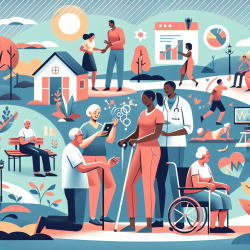The study titled "Experiences of community-dwelling older adults living with multiple chronic conditions: a qualitative study" offers valuable insights into the lives of older adults managing multiple chronic conditions (MCC) while living in the community. As practitioners, understanding these experiences can significantly improve how we approach care and support for this demographic.
The Complex Experience of Living with MCC
Older adults living with MCC face a myriad of challenges that are both multifaceted and deeply personal. The study identified five key themes that encapsulate their experiences:
- Trying to Stay Healthy: Despite worsening conditions, older adults strive to maintain health through physical activity, healthy eating, and medication adherence.
- Dependence on Family Caregivers: Family members play a crucial role in providing emotional support and assistance with daily activities.
- Financial Strain: The costs associated with managing MCC can be overwhelming, affecting transportation, medications, and even employment.
- Healthcare Decisions by Proxy: Many older adults rely on healthcare providers to make decisions, often due to a lack of understanding or confidence in managing their conditions.
- Ineffective Healthcare Services: Current healthcare systems often fail to address the complex needs of individuals with MCC, leading to fragmented and impersonal care.
Implications for Practitioners
This research underscores the need for a person-centered and family-centered approach to healthcare. Here are some strategies practitioners can implement:
1. Enhance Communication and Coordination
Improving communication between healthcare providers and patients is crucial. Practitioners should ensure that information is shared effectively and that patients understand their treatment options. Coordination among different healthcare services is also essential to provide comprehensive care.
2. Engage Patients in Decision-Making
Encouraging active participation in healthcare decisions can empower older adults. Practitioners should facilitate discussions that consider the complex interplay of various chronic conditions and help patients prioritize their health goals.
3. Support Family Caregivers
Family caregivers are vital in managing MCC. Providing them with resources and support can alleviate caregiver burden and enhance the quality of care for older adults. Practitioners should involve caregivers in care planning and offer guidance on managing stress and responsibilities.
4. Address Social Determinants of Health
The financial burden of MCC is significant. Practitioners should be aware of the socioeconomic factors affecting their patients' health and work towards connecting them with financial assistance programs or community resources that can help mitigate these challenges.
The Path Forward: Encouraging Further Research
This study highlights areas where further research could provide deeper insights into improving care for older adults with MCC. Exploring cultural diversity among this population, understanding gender differences, and examining the role of social determinants are crucial next steps.
Practitioners are encouraged to delve into these areas through further research or by staying informed about emerging studies in this field. By doing so, they can continue to refine their approaches and contribute to better health outcomes for older adults living with MCC.
To read the original research paper, please follow this link: Experiences of community-dwelling older adults living with multiple chronic conditions: a qualitative study.










